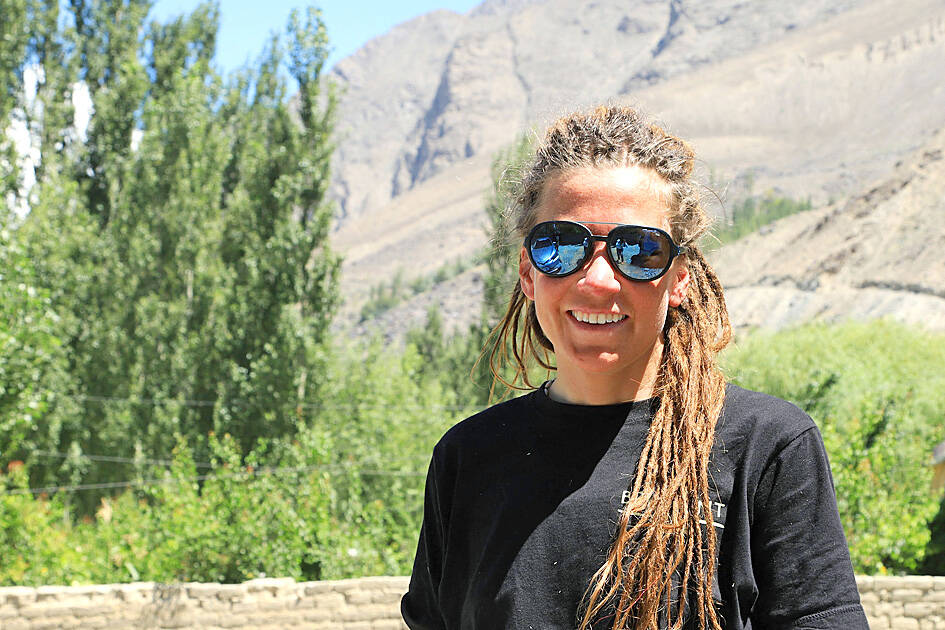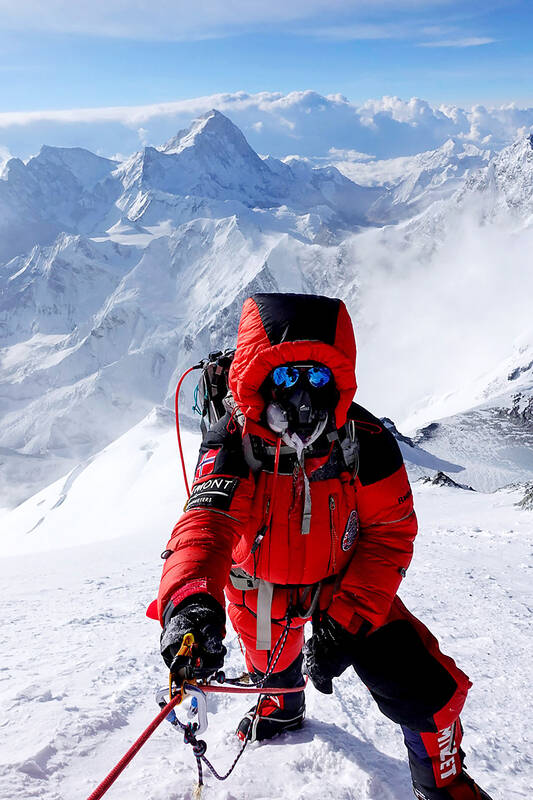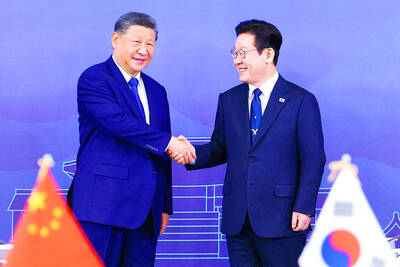Norwegian climber Kristin Harila is only three peaks away from achieving the lung-busting feat of scaling the world’s 14 highest mountains in record time, but another obstacle stands in her way: getting a pass from the Chinese authorities to visit Tibet and conquer the summits of Shishapangma and Cho Oyu.
Having climbed 11 of the Earth’s 14 peaks above 8,000m since April 28, including Mount Everest, Annapurna and K2, Harila must scale Shishapangma, Cho Oyu and Manaslu in Nepal before Nov. 4 to make history.
Nepalese Nirmal Purja holds the current record after completing the 14 climbs within six months and six days in 2019.

Photo: AFP
Chinese authorization would be the “decisive” factor in completing the final stage of her quest on time, she told reporters in Oslo after spending two weeks resting in her homeland.
China has rarely issued climbing permits for Tibet in the past few years and largely sealed its borders during the COVID-19 pandemic.
Harila, 36, reckons she can complete the set of so-called “super peaks” by the middle of next month in the best-case scenario, making a total of five-and-a-half months.

Photo: AFP
Manaslu should pose no problem, as the summit is in Nepal. Cho Oyu can in theory be climbed from the Himalayan country, although no one has undertaken that route to reach the top.
However, the Shishapangma ascent requires Chinese approval, and Harila’s first application was rejected a few weeks ago “as expected,” she said.
If the authorities continue to refuse, it would sound the death knell for Harila’s mission, but she remains optimistic about obtaining the coveted pass.
Doing 13 peaks and not having the authorization for the last one would be “horrible,” she said.
“But I’m not thinking about it too much for the moment,” she said. “It’s important to focus on one summit at a time.”
Harila was planning to head to Nepalese capital, Kathmandu, yesterday and set her sights on tackling Manaslu between Sept. 20 and 25.
“You have to respect each mountain, the weather, the conditions of the day, not take things lightly. If you don’t manage to reach the top, you go back down and try again,” she said.
Harila, a native of Vadso in Norway’s far north where the highest point is 633m above sea level, did not take to climbing from an early age, dedicating herself to soccer, handball and cross-country skiing.
It was only in 2015 that she achieved her first noteworthy climb — Mount Kilimanjaro in Tanzania.
When tackling Everest last year, the Norwegian left her sherpa, Pasdawa, trailing in her wake, and her climbing prowess outshone her other guide, Dawa Ongju, on K2 this year.
She said every conquered summit brings fresh joy that she savors by unfurling the flags of Norway and the indigenous Sami people.
“When you’re at the top, you’ve only covered half of the way. Climbing is often hard because you’ve got less and less oxygen, but going down is often equally difficult,” she added.
After attempting to complete the world’s 14 tallest mountains, Harila intends to keep going.
She is thinking of attempting the “Triple Crown” of Everest and two neighboring peaks, Lhotse and Nuptse, in a single season — “maybe without [extra] oxygen.”

‘CHILD PORNOGRAPHY’: The doll on Shein’s Web site measure about 80cm in height, and it was holding a teddy bear in a photo published by a daily newspaper France’s anti-fraud unit on Saturday said it had reported Asian e-commerce giant Shein (希音) for selling what it described as “sex dolls with a childlike appearance.” The French Directorate General for Competition, Consumer Affairs and Fraud Control (DGCCRF) said in a statement that the “description and categorization” of the items on Shein’s Web site “make it difficult to doubt the child pornography nature of the content.” Shortly after the statement, Shein announced that the dolls in question had been withdrawn from its platform and that it had launched an internal inquiry. On its Web site, Le Parisien daily published a

China’s Shenzhou-20 crewed spacecraft has delayed its return mission to Earth after the vessel was possibly hit by tiny bits of space debris, the country’s human spaceflight agency said yesterday, an unusual situation that could disrupt the operation of the country’s space station Tiangong. An impact analysis and risk assessment are underway, the China Manned Space Agency (CMSA) said in a statement, without providing a new schedule for the return mission, which was originally set to land in northern China yesterday. The delay highlights the danger to space travel posed by increasing amounts of debris, such as discarded launch vehicles or vessel

RUBBER STAMP? The latest legislative session was the most productive in the number of bills passed, but critics attributed it to a lack of dissenting voices On their last day at work, Hong Kong’s lawmakers — the first batch chosen under Beijing’s mantra of “patriots administering Hong Kong” — posed for group pictures, celebrating a job well done after four years of opposition-free politics. However, despite their smiles, about one-third of the Legislative Council will not seek another term in next month’s election, with the self-described non-establishment figure Tik Chi-yuen (狄志遠) being among those bowing out. “It used to be that [the legislature] had the benefit of free expression... Now it is more uniform. There are multiple voices, but they are not diverse enough,” Tik said, comparing it

RELATIONS: Cultural spats, such as China’s claims over the origins of kimchi, have soured public opinion in South Korea against Beijing over the past few years Chinese President Xi Jinping (習近平) yesterday met South Korean counterpart Lee Jae-myung, after taking center stage at an Asian summit in the wake of US President Donald Trump’s departure. The talks on the sidelines of the APEC gathering came the final day of Xi’s first trip to South Korea in more than a decade, and a day after his meeting with the Canadian prime minister that was a reset of the nations’ damaged ties. Trump had flown to South Korea for the summit, but promptly jetted home on Thursday after sealing a trade war pause with Xi, with the two